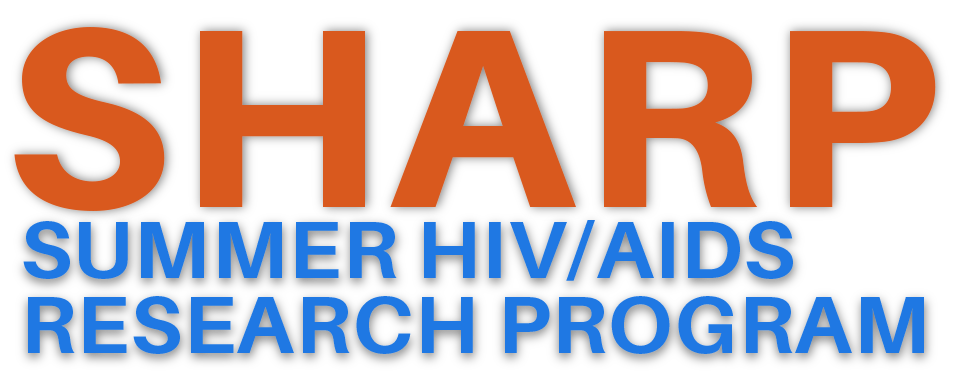This is a transcript of the video The Summer HIV/AIDS Research Program: SHARP
Introduction
In our current context there are so many health disparities that have been happening for years now and we know that they’re there and we’re trying new strategies every day but we really need to have people who are from the communities most affected by the health disparities to make a difference in those communities we have to have culturally appropriate care.
My name is Melvin Faulks.
My name is Katie Rivas.
My name is Kennedy Countess.
I’m Eric Lam.
My name is Lauren Kemmeter.
My name is Michael Salib.
What is SHARP
I’m Jacki Lewis and I’m a SHARP Scholar.
My name is Aminta Kouyate and I am the Program Coordinator for the Summer HIV/AIDS Research Program also known as The SHARP Program.
The SHARP Program is a 12-week mentored summer research experience located at the San Francisco Department of Public Health within the Center for Learning and Innovation. It’s where students get to come in and get kind of a real hands-on experience doing public health research.
They have the idea of what a researcher is and they have the idea of who they are as people and my job is to connect those two to make sure that they know that they can have an impact on the world that they want to have through research. The SHARP program is very important because it provides this opportunity to train young researchers of color and I think there’s an immense need to start earlier on in the pipeline. I think many of the projects that we do and this year was without exception are really very applied and what we learn from those research projects really have an impact in how we do our HIV prevention work. I was working with my mentor John this summer and we were looking at acculturation adherence to ART which is antiretroviral therapy and substance use and we’re looking in a sample of Latino MSM on the U.S Mexico border. This summer one of my mentors is Jess Lin and Interview she’s the Project Director of the Transnational Study.
It’s an HIV study studying risk and resilience and it’s one of the longest longitudinal studies there is. So what we were supposed to do, well, what what we got asked to do is to recruit at Trans March because that’s where a lot of folks that might be eligible for the study might be at. I did the SHARP Program in 2014 and I was actually placed in the current department that I work in, Bridge HIV. My project was about sort of assessing what providers in the Bay Area thought about PrEP and identifying ways on how to enhance what they know and what their perceptions are about it. My goal is to become an epidemiologist specifically working in HIV surveillance and this summer I got to learn what that really looks like. Just being exposed to that work and people that are doing that has just helped me immensely. The best part is this symposium kind of at the end — to really see them excel and to go up and give a full presentation and be professional. All of them had amazing presentations and their ability to be able to conduct those presentations and also answer questions from experts within the crowd, that was just an amazing experience it made me feel like I should go get my PhD. Before the symposium there was a lot of nervous energy and build up because it was kind of a big moment it was like then we’re gonna talk about everything we’ve been doing this summer. Once I stepped up there you just kind of start talking and then it kind of just all came out. I worked with Philip Coffin and Emily Behar and early on in the summer we were kind of talking about the presentation. I guess I was expressing some concern about like presenting and speaking in front of people and how to make it all coherent and Phillip said that all of science is basically a story and I thought that’s like a great way to think about it. I have absolute kind of certainty or belief that having good mentors is what differentiates someone having a successful health despairities public health research career. Me and my mentor have like the best relationship possible. He’s so loving, so open-minded, so supportive. I think the environment at DPH is not what I thought a research environment would be like.
Everyone’s super friendly and open and also really dedicated smart. It overall just changed my outlook on how I wanted to tackle social inequities in health. I just thought it was just gonna be a scientific internship. It was not really a scientific internship it was more like find who you are, define yourself as a scientist. And we all get to define ourselves as a scientist and we all get to shape who we are and just be authentic to all our identities.
